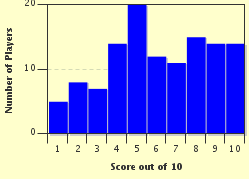Quiz Answer Key and Fun Facts
1. The first story we have of an adult Moses happened while he was still living as an Egyptian and as part of Pharaoh's extended family. He had learned that he was an Israelite, so when he saw an Egyptian beating a Hebrew slave, he "looked this way and that way, and when he saw no one" he came to the aid of the Israelite, killed the Egyptian, and hid the corpse in the sand.
That's a pretty dramatic start to the story of Moses. What happened next?
2. After 40 years with no dramatic events, Moses was working as a shepherd when he ran into God at a bush that was burning without being consumed. God told Moses to return to Egypt, confront Pharaoh, and get the Israelites out of Egypt. Moses refused at first, so reluctant that "the anger of the Lord blazed against Moses." But after a long debate with God, complete with several persuasively miraculous signs, Moses collected his family and set out for Egypt. However, en route he angered God again, and God "sought to kill him" by making him seriously ill.
We know God didn't kill Moses, so what did happen?
3. One of the most dramatic events in Moses' life was the confrontation with Pharaoh which included the 10 plagues. The confrontation started with Moses and Aaron stating their case, and Aaron throwing down his rod, which turned into a snake. But Pharaoh's magicians were able to duplicate the magic, as were they able to duplicate (on a smaller scale) the water turning to blood and other plagues. However, they finally came to plagues they could not reproduce.
What was the first plague the court magicians could not reproduce -- and what did the magicians then do?
4. Pharaoh changed his mind and wanted his slaves back, so he and his army chased Moses and the crowd of Israelites. The Israelites were backed up against the Red Sea, with no way to escape, when the best known, most dramatic moment in Moses' life occurred. God told Moses to hold his staff over the water, and the waters parted, letting the Israelites walk to the other side of the waters on dry ground. Naturally Pharaoh's army chased them, at which time the waters came crashing back down and drowned the army.
The Children of Israel must have felt an incredible group adrenaline rush! But, safe and relieved, what did they do next?
5. The Israelites left the Wilderness of Sin by stages and camped at Rephidim. When they discovered that there was no water, they complained to Moses: "Why did you bring us up out of Egypt to kill us with thirst?" Moses in turned complained to God, "What shall I do with this people?"
Jehovah told him. What did Moses do next?
6. God spoke to the people out of the thunder and lightning on Mount Horeb-Sinai and proclaimed the Ten Commandments. Then Moses went up the mountain to commune with God. He was so long that the people became afraid and insisted Aaron make an idol for them. Aaron took their ornaments and made a calf of gold. When Moses came down after 40 days, carrying two tablets of stone on which the 10 commandments were written, he was so furious about the golden calf that in one of his most dramatic moments he smashed the tablets against the rocks. The drama continued as Moses followed up by doing all of the following EXCEPT which?
7. In Numbers 20, the people were grumbling and complaining yet again, and yet again Moses turned to God. God told Moses what he should do, but this time Moses was so angry and frustrated that what he did next made God angry enough to punish him by keeping him from ever entering the Promised Land.
What was it that Moses did next that cost him so dearly?
8. Moses faced several rebellions while he led the people to Canaan. The most dramatic was when Levite leaders Korah, Dathan, and Abiram complained that the Levites were holy to the Lord as well, and Moses and Aaron should not "lift yourselves up above the assembly of the Lord." After several angry exchanges, the two sides lit incense in censers and stood at the entrance of the Tent of Meeting. Moses announced "If these men die the common death of all men...then the Lord has not sent me." Then all of the following happened EXCEPT which?
9. Moses regularly had to deal with the people, were constantly grumbling against him and often even the Lord. On one occasion, when they complained "we loathe this light (contemptible, unsubstantial) manna," "the Lord sent fiery (burning) serpents among the people; and they bit the people, and many Israelites died."
As so often, Moses tried to intervene and prayed for the people. What did God instruct Moses to do that saved many lives?
10. At the end of his life, Moses and God had one last dramatic encounter before he died. Which of these was it?
Source: Author
NormanW5
This quiz was reviewed by FunTrivia editor
CellarDoor before going online.
Any errors found in FunTrivia content are routinely corrected through our feedback system.

